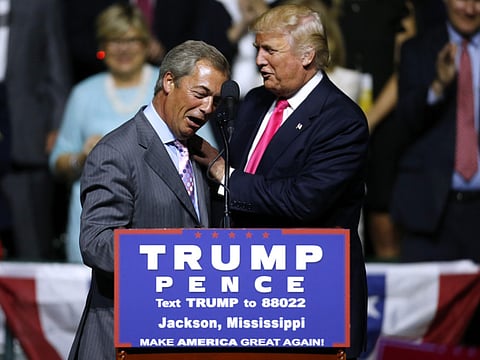Trump and Farage playing the same dangerous game
The GOP presidential nominee has enlisted Farage to help him airbrush bigotry from his message in much the same way Farage did with Brexit

Donald Trump’s movement has often been compared to that of a right-wing European party. Now, his union with Europe’s right is official. At a rally on Wednesday, Trump presented himself as America’s Nigel Farage, holding the former United Kingdom Independence Party leader up as his populist, nationalist twin. Make it a long-lost twin for Trump, who, when first asked for an opinion on whether Britain should leave the European Union (EU), had appeared to be unfamiliar with the referendum in question.
Fast-forward to the day after the referendum, though, and Trump would boast he had predicted the British exit from the EU all along. Earlier this month, the Republican presidential nominee rebranded himself “Mr Brexit” in a tweet; and now he’s getting even more explicit about what promise he sees in the tale of British secession.
“On 23 June, the people of Britain voted to declare their independence — which is what we’re looking to do also, folks! — from international government,” Trump told his audience in Jackson, Mississippi. Jackson is a place where the memory of the Confederacy is still fresh, and as such a curious one in which to be touting a second independence day, of sorts. But such white nationalist fervour seemed to play well with the overwhelmingly white crowd assembled in the largely black city on Wednesday night.
The architects of Brexit like to frame the vote as a righteous backlash against powerful elites. As Farage put it on Wednesday: “You can beat the pollsters. You can beat the commentators. Anything is possible if enough decent people are prepared to stand up against the establishment.”
According to this oft trotted-out framing, Trump’s reviled Washington establishment is a parallel for Farage’s European Commission. But the hyper-focus on anti-elitism obscures the far less righteous xenophobia, racism and anti-immigrant sentiment that were also elements of the Leave campaign.
Such uninspiring qualities are the core of Trump’s movement too, and that was apparent in no small number of crowd-pleasing lines. “Why do our leaders spend so much more time talking about how to help people [who are] here illegally than they spend trying to help American citizens?” Trump asked. “The media ignores the plight of Americans who have lost their children to illegal immigrants, but spends day after day pushing for amnesty for those here in violation of the law.”
The bigotry of Trump’s campaign is, if anything, more extreme. While the Leave campaign leaders in Britain, such as Boris Johnson, would at least distance themselves from the anti-immigrant rhetoric espoused by Farage and others, Trump has embraced it. And even Farage himself has suggested that some of Trump’s anti-Muslim rhetoric goes too far.
Trump has long harnessed America’s wave of white nationalism. But with the encouragement of his campaign’s new chief executive, Stephen Bannon (previously an outspoken Brexit cheerleader at the right-wing Breitbart news website), he has now harnessed something else. Namely, he’s enlisted Farage to help him airbrush bigotry from his message in much the same way Farage did with Brexit.
It’s telling that in the wake of Brexit’s victory Farage has, rather than assuming a position of leadership, found himself stoking populist flames elsewhere.
And it underscores another unspoken parallel with Trump: Trafficking in the politics of anger — not governance — is what he does best. If Trump wins in November, expect more of the same.
— Guardian News & Media Ltd


